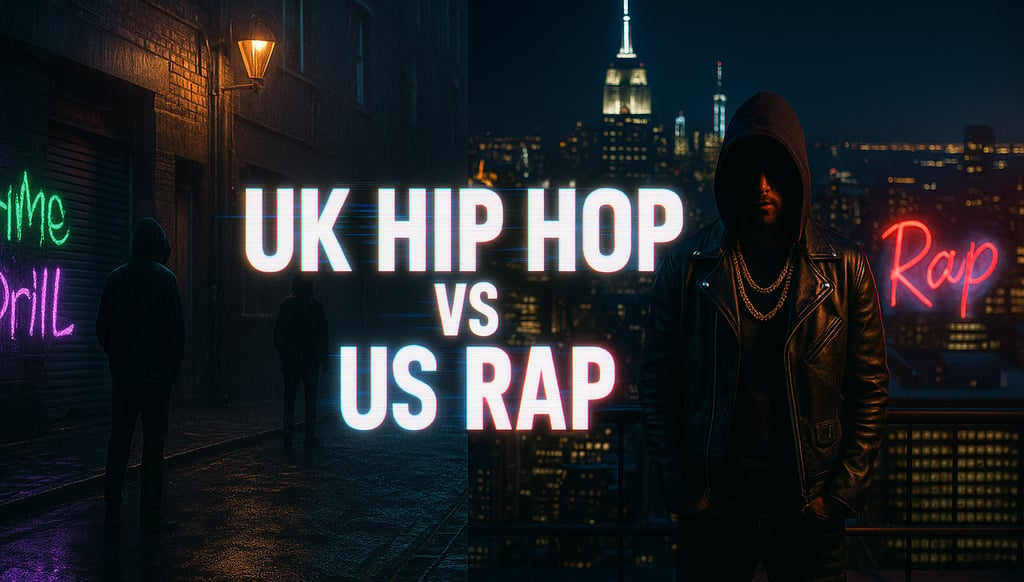UK Hip Hop vs US Hip Hop: Grime, Drill & British Accents
8/12/20252 min read


Hip hop has evolved into distinct regional styles worldwide. In the UK, grime and UK drill have emerged as defining movements, driven by local culture, dialect, and social context. Across the Atlantic, US rap remains the genre’s cornerstone, with its own subgenres and linguistic nuances. This article explores their origins, sonic traits, lyrical themes, and the role of British accents in shaping UK hip hop’s identity.
1. Origins and Cultural Context
UK Grime
Born in East London in the early 2000s, grime fused elements of UK garage, jungle, and dancehall.
MCs like Wiley, Dizzee Rascal, and Skepta popularized rapid-fire flows over 140-bpm beats, reflecting urban youth experiences.
UK Drill
Emerged in South London around 2017, influenced by Chicago drill’s dark, syncopated rhythms.
Artists such as Headie One and Unknown T adapted drill to UK street narratives, adopting local slang and flows.
US Rap
Originated in 1970s Bronx block parties, evolving through boom-bap, gangsta rap, trap, and beyond.
Regional scenes (East Coast, West Coast, Southern trap) each contributed distinct rhythms and thematic focus.
2. Production and Sonic Characteristics
Tempo & Rhythm
Grime: Fast-paced, typically 140 bpm; syncopated, staccato drum patterns.
UK Drill: Slower than grime at ~130 bpm; sliding 808s, skittering hi-hats, eerie melodies.
US Rap: Varies widely—boom-bap (85–95 bpm), trap (130–160 bpm), conscious rap often mid-tempo.
Instrumentation
Grime: Minimalist synth stabs, razor-sharp basslines, chopped vocal samples.
Drill: Dark piano or bell motifs, heavy sub-bass, sparse atmospheric pads.
US Rap: Diverse palette—jazz loops (boom-bap), Southern trap’s booming 808s, soul samples (neo-soul rap).
3. Lyrical Themes and Delivery
Content Focus
Grime: Social commentary, street life, personal ambition, community pride.
UK Drill: Gritty street narratives, survival, local rivalries.
US Rap: Broad themes—from gangsta tales and luxury lifestyles to introspection and political activism.
Flow & Cadence
Grime MCs employ rapid, clipped flows with intricate rhyme schemes.
Drill rappers use measured, half-time cadences that emphasize groove over speed.
US rappers vary—East Coast lyricism is dense and complex; Southern trap favors melodic, auto-tuned delivery.
4. The Role of British Accents
Identity & Authenticity
British accents in grime and drill underscore local identity, distinguishing UK hip hop from US counterparts.
Regional dialects (London “roadman” slang, Jamaican Patois influences) enrich the vocabulary and rhythmic delivery.
Embracing native accents challenges historical pressures to emulate American speech patterns.
Global Appeal
Artists like Stormzy, Dave, and Central Cee have shown that British accents can resonate globally, offering fresh sonic textures.
Their success illustrates hip hop’s adaptability: authenticity often trumps assimilation when reaching international audiences.
5. Crossover and Influence
Collaborations
US artists increasingly collaborate with UK talent—Drake’s “More Life” drew heavily on grime culture; A$AP Ferg enlisted UK drill producers.
UK acts remix US hits (“Funky Friday” by Dave and Fredo) to bridge audiences.
Streaming & Social Media
Platforms like Spotify playlists and TikTok trends have facilitated rapid cross-pollination, exposing fans to both scenes.
Viral dance challenges and remix culture blur regional boundaries.
Conclusion
While UK grime and drill owe their roots to American hip hop, they have blossomed into unique genres defined by local rhythms, accents, and lived experiences. US rap’s vast subgenre landscape continues to innovate globally, yet the distinctive energy of British flows and dialects ensures UK hip hop remains a powerful and authentic force on the world stage.

🎶 Get The Bars, The Beats, The Backstories – Direct to Your Inbox.
Send your Articles
Stay updated with the latest hip hop trends.
Stay Connected
rap@grillg.com
+91-9911428513
© 2024. All rights reserved.
